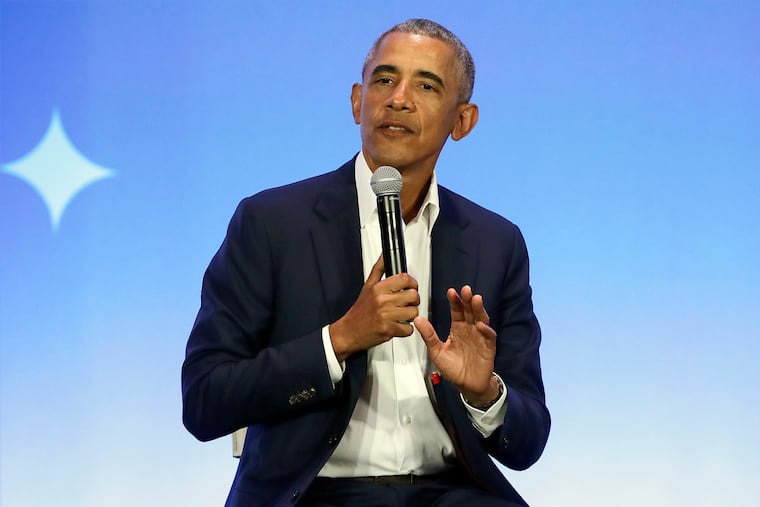Obama is right: Slogans like ‘defund the police’ are off-putting. But that doesn’t negate the need for reform. | Jenice Armstrong
The slogan scares people. But that doesn’t mean we don’t need to rethink policing. Maybe we do need to allocate fewer taxpayer dollars to law enforcement and provide more for mental health services.

One of my most apolitical friends is in a tizzy about the defund the police movement.
No matter what I say, she is convinced that it means abolishing police.
I understand her confusion. The slogan “defund the police” was a misnomer from the start because it sounds as if all activists are calling for a complete end to law enforcement as opposed to systemic changes.
So, I am inclined to agree with former President Barack Obama, who said in an interview that aired Wednesday: “If you believe, as I do, that we should be able to reform the criminal justice system so that it’s not biased and treats everybody fairly, I guess you can use a snappy slogan, like ‘defund the police.’ But, you know, you lost a big audience the minute you say it, which makes it a lot less likely that you’re actually going to get the changes you want done.”
The slogan — and I hate calling it that because it’s really a demand — scares people like my friend. It’s easy to twist in campaign ads as we saw during the last election cycle. But that doesn’t mean we don’t need to rethink policing. Maybe we do need to allocate fewer taxpayer dollars to law enforcement and provide more for mental health services. Maybe we do need to spend less on overtime and more on crime prevention. It’s at least worth a conversation.
One thing’s for sure, though: The words defund the police catch your attention way better than something less snappy, like let’s institute police reform. They wake people up the way they woke up my friend.
Michael Eric Dyson, whose latest book, Long Time Coming: Reckoning With Race in America, was published Tuesday, says the focus needs to be squarely on reform.
“You don’t want to criticize the people who are trying to fight for social justice more than you criticize the injustice of policing,” he pointed out.
I got a rare chance to interview Dyson in advance of his scheduled Dec. 9 appearance to discuss his latest book at a virtual event sponsored by WHYY and the Literary Cafe. We talked about all kinds of things, including the defund the police movement.
“Look, I’m on the left as well, but I’m not tied to the language,” Dyson told me. “Do you want the commercial or do you want the product? The commercial is ‘defund the police.’ The product is, how do we get the police to behave in a way that is just? And if it means that we reorganize the logic of policing, then so be it.
“So I split the difference between Obama’s argument that these snappy phrases, I believe he called it, may do more harm than good. But then, go on after saying that to amplify the good work that is intended there. Go on to say what we can do to make certain that we move monies from police departments over to mental health care facilities.”
Dyson brought up the October police killing in West Philadelphia of Walter Wallace Jr., a 27-year-old Black man armed with a knife who had a long history of mental illness.
“Why is it that the police are showing up for Mr. Wallace as opposed to a trained therapist?” Dyson asked. “What defunding the police means, I think, is a good thing. But at the end of the day, I think that we have to use the language that will be most likely to succeed.”
He pointed out that prior to the Civil War most white people were opposed to abolition.
“They were opposed to that snappy phrase called ‘abolish slavery’ and yet, it was the right thing to do,” Dyson told me.
I could have talked to Dyson all day, which is why I may purchase a ticket to next Wednesday’s book event hosted by WHYY’s Annette John-Hall at 6 p.m.
Better yet, I should get a ticket for my apolitical friend since I’m sure the subject of defunding the police will come up.